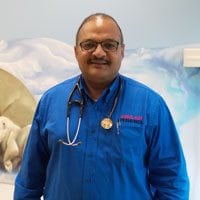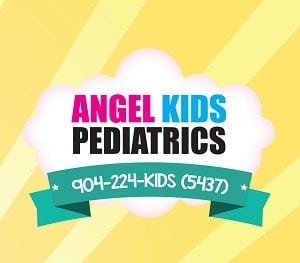Brought to you by Angel Kids Pediatrics. From infants to teens, Dr. Ashraf Affan, Founder and Medical Director of Angel Kids Pediatrics answers common questions from parents.

INFANTS
How do I know if my son is getting enough to eat? I am breastfeeding, and he wants to eat about every two hours. Is this normal?
Dr. Affan: Newborns and infants need around 18 ounces of milk per day, and this amount increases as they grow. With newborns, their stomach size is very small, and it can usually accommodate 2 ounces at every feeding, every three or four hours. Four hours is the maximum allowable time a newborn can go without food. By 1 month old, babies start to eat more and their stomachs can accommodate 4 ounces at each feeding. Around this time they may be able to sleep six hours at night, and by 4 to 6 months old, babies will be able to sleep up to 10 hours at night. Most physicians would also recommend starting to incorporate cereals and other solid foods around 6 months of age.
TODDLERS/PRESCHOOL

My son’s ears have a buildup of wax. How do I safely remove it?
Dr. Affan: Everyone produces wax, but some overproduce and build up more than others. If your baby or child is having a lot of ear wax buildup, mention this to your pediatrician, and he or she can help you remove the wax during an office visit. There are also some over-the-counter, oil-based ear drops that will help remove wax.
Try placing a few drops of hydrogen peroxide in each ear while the child is laying sideways and let it sit for a minute. Then have the child take a warm shower, and let the shower head hit their ear to break up and remove all the wax that was loosened up by the hydrogen peroxide.

ELEMENTARY
I have asthma and allergies and see some of the same symptoms in my daughter. What tests should she have to see if she has asthma as well?
Dr. Affan: Most allergies are due to environmental agents or food (including medication allergies). Signs of allergy can include watery eyes, sneezing, itchiness of the skin, and sometimes, dark circles under the eyes. Food allergies can be manifested by hives, skin rash, vomiting or diarrhea. Asthma is an abnormal immunologic/allergic response in the lung to infection, allergies, weather, exercise, and emotions. This response will create tightening in the bronchioles in the lungs and mucus production in the small and large airways of the lungs.
Allergies and asthma can be related to each other and can run in families. Asthma is diagnosed by a physical exam. To label a child as having asthma, he or she needs to have three episodes of wheezing within one year (12-month duration); a family history of asthma in one parent will make this diagnosis stronger. There is a test called a pulmonary function test that helps physicians diagnose asthma. It measures different volumes and breathing patterns for individuals and helps in the diagnosis of asthma.
 TEENS
TEENS
Do you recommend the HPV vaccination for teenage girls who are not sexually active?
Dr. Affan: There are more than 40 types of Human Papillomavirus (HPV) that can infect the genital area of males and females. These HPV types can also infect the mouth and throat. Most people who become infected with HPV do not even know they have it. HPV infections can cause genital warts, cervical cancer, and other less common, but serious, cancers including cancers of the vulva, vagina, penis, anus and oropharynx. HPV is passed on through genital contact, and a person can even acquire the signs and symptoms of HPV years after they had sexual contact with an infected person.
The HPV vaccine is the only vaccine that gives 100 percent protection against cervical cancer in females. It is recommended for both teen boys and girls, even if they are not sexually active right now, so that they are already protected for a future relationship, in case that partner might have had HPV in the past.

About Dr. Ashraf Affan, Founder and Medical Director of Angel Kids Pediatrics
Dr. A. Affan is a Board Certified Pediatrician with over 20 years of experience in different international as well as national settings. Dr. Affan had his pediatric training at the State University of New York in Long Island and served as a Chief Resident after finishing his residency. Dr. Affan worked as a consultant for many international health organizations such as the World Health Organization (WHO) and the Adventist Development and Relief Agency (ADRA) in Africa. Dr. Affan is the founder and Medical Director of Angel Kids Pediatrics and has been providing services to children and families in Jacksonville since 2003.
 About Angel Kids Pediatrics
About Angel Kids Pediatrics
As pediatric providers in Jacksonville, FL, Angel Kids Pediatrics take pride in being one of the fastest growing Pediatric practices in Duval County. Offering FREE Prenatal visits (meet & greet) and our popular Newborn Seminars to help new mothers get the information they need to start caring for their newborns. Angel Kids Pediatric offices in Jacksonville are always accepting new patients from newborns to age 21. For more information on and a listing of Jacksonville locations, visit our Family Directory.
















